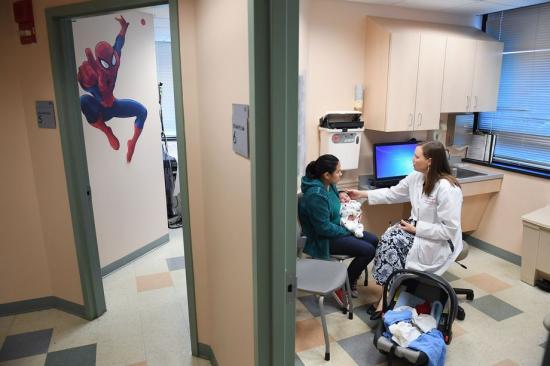American kids are 70 percent more likely to die before adulthood than kids in other rich countries
A new study ranks 20 wealthy countries on childhood deaths. The US comes in last.
/cdn.vox-cdn.com/uploads/chorus_image/image/58251149/878282222.jpg.0.jpg)
A child born in the United States has a 70 percent greater chance of dying before adulthood than kids born into other wealthy, democratic countries, a new study has found.
The research, published in the journal Health Affairs on Monday, shows that the United States lags far behind peer countries on child health outcomes. It estimates that, since 1961, America’s poor performance accounts for more than 600,000 excess child deaths — deaths that wouldn’t have happened if these kids were born into other wealthy countries.
“In all the wealthy, democratic countries we studied children are dying less often then they were 50 years ago,” Ashish Thakrar, the study’s lead author, said. “But we found that children are dying more often in the United States than in any similar country.”
/cdn.vox-cdn.com/uploads/chorus_asset/file/9998545/OECD_v_US_child_mortality_rate.jpg) Christina Animashaun/Vox
Christina Animashaun/VoxThe study comes out three months after Congress allowed funding for the Children’s Health Insurance Program — which provides insurance to nine million low-income kids — to expire. And it builds on data released earlier this year, which finds that overall life expectancy in the United States has declined for the past two years — a troubling trend that hasn’t been seen since the 1960s.
Infants in the US have a 76 percent higher risk of death than in other wealthy nations
Between 2001 and 2010, researchers found that the risk of death in the United States was 76 percent higher for infants than in peer countries. In addition, the US has an infant death rate from extreme prematurity three times that of its peer countries.
The new Health Affairs study compared the United States to 19 other wealthy, democratic countries including Canada, Australia, France, Sweden, and the United Kingdom.
It found that all 20 countries have seen declines in childhood deaths since the 1960s, a positive trend. At the same time, it also shows that the United States has ranked the worst in childhood deaths since the 1990s.
Thakrar and his co-authors found that the United States is especially far off from its peer countries when it comes to infants and teenagers.
Thakrar argues that some of this most likely has to do with America’s fragmented health care system. A new mother may go without health insurance before becoming pregnant — when she would usually qualify for Medicaid — and that could lead to untreated health issues ultimately affecting the child.
“It really seems to be the impact of our fragmented health care system,” Thakrar says. “Mothers who are qualifying for Medicaid for the first time because they’re mothers might be seeing doctors for the first time. They might not have a family physician, or a clear support system.”
Other social factors likely play a role. Thakrar, for example, points to the rise in childhood poverty in the 1980s that coincided with the United States falling behind its peer countries on health outcomes.
/cdn.vox-cdn.com/uploads/chorus_asset/file/9998553/US_poverty_rate_U18.jpg) Christina Animashaun/Vox
Christina Animashaun/VoxTeenagers in the United States are 82 times more likely to die from gun homicide
Teenagers also have significantly poorer outcomes in the United States.
Perhaps most startling, children between the ages of 15 and 19 are 82 times more likely to die from gun homicide in the United States than in peer countries.
America has 4.4 percent of the world’s population, but almost half of the civilian-owned guns around the world. Researchshows that the more guns in a country, the more gun deaths. Conversely, states with fewer guns have fewer gun deaths.
And US teenagers are twice as likely to die in car accidents than their peers abroad.
Kids are dying in the United States more than other countries. Congress isn’t funding kids’ health insurance.
The Children’s Health Insurance Program is a cheap, successful program that provides health care coverage to nine million low and middle-income children. Its budget expired 100 days ago — and Republicans in Congress have done next to nothing about it.
Multiple states have sent out letters warning families that their kids’ health insurance may end on January 31. Congress did pass a temporary bill that it expected to extend CHIP’s lifespan until March — but it turns out, they got the math wrong, and states may run out of funding as early as January 19.
Earlier this year, Congress failed to reauthorize spending for a home visitation program that serves low-income families and their children. Funding for Maternal, Infant, and Early Childhood Home Visiting ran out the same day as CHIP, and there is no conversation about extending its budget.
Thakrar worries that the instability in how we fund health care programs will only exacerbate the United States’ dismal performance on child health — and that it’s hard to see the situation improving without a clear government commitment toward improving children’s health.
“We’re seeing the effects of instability right now,” he said. “All across the country families are waiting to hear if CHIP will be reinstated, whether they’ll continue to have health insurance, their household visitations are at risk. Programs that have proven their benefit in the country still face constant instability.”





















